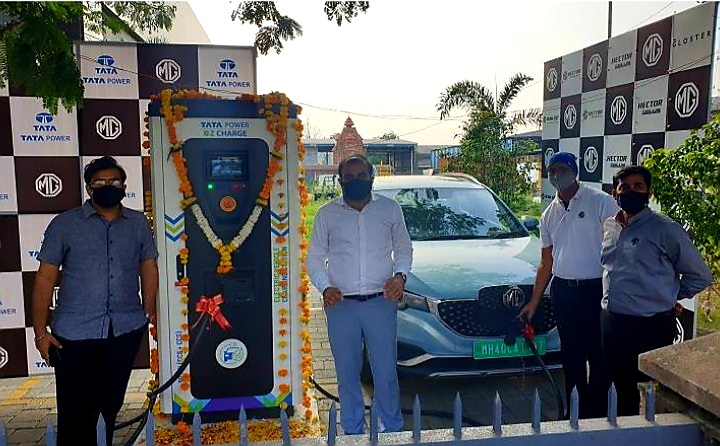MG Motor India and Tata Power inaugurated the first superfast charging EV station in city. The move is to further strengthen the electric vehicle ecosystem in the country, which will see the deployment of 50kW DC superfast charging across the country.
This new public EV charging vehicle is compatible with CCS/CHAdeMO fast-charging standards and is in line with the carmaker’s commitment to provide a 5-way charging system. With this fast charger, the MG ZS EV can be charged upto 80% in 50 minutes.
MG Motor India says that the other charging options with the ZS electric SUV include free of cost AC fast-charger installation at the customer’s office, extended charging network and a cable charger.

Chief Commercial Officer of MG Motor India Gaurav Gupta said that with the further strengthening the EV charging ecosystem in Nagpur, the partnership aims to provide customers with a robust charging ecosystem to promote the adaptation of cleaner and greener mobility solutions .
Mr Gupta said that they are very confident that it will pave the way for superior EV adoption in the region. With Tata Power as partner we are confident that we will create a distinct synergy together.
Mr Rajesh Naik, chief of New Business Services of Tata Power said, “Now more than ever business have to be with a purpose i.e. to ensure responsibility of protecting our environment. Our collaboration with MG Motor demonstrates our commitment to add impetus to the EV migration in India and Nagpur’s first-ever superfast charging EV station is just the beginning.
Presently, MG Motor India has a total of 10 Superfast 50kW charging stations across its dealerships in five cities- New Delhi, Mumbai, Ahmedabad, Bangalore and Hyderabad.
Tata Power has also established elaborate EV charging ecosystem with over 200 charging points in 24 different cities under the EZ charge brand along with a digital platform to falicitate an easy and smooth customer experience.
The MG-Tata Power partnership aims to involve core values and operating models that are in line with their existing customer-centric approach.
👉 Click here to read the latest Gujarat news on TheLiveAhmedabad.com




